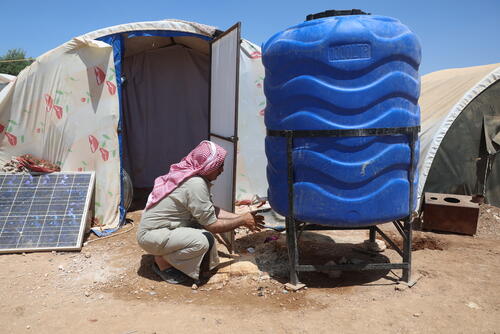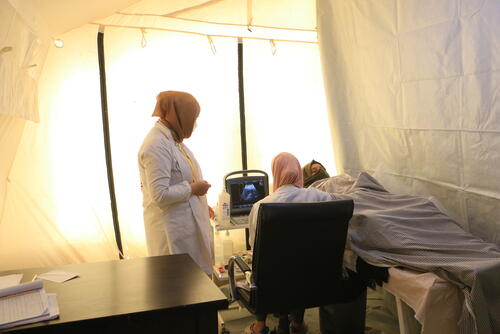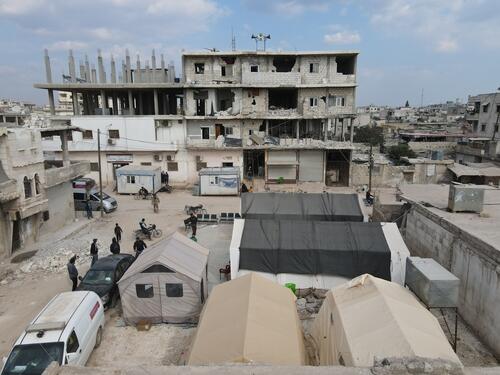Six months have elapsed since the catastrophic earthquakes struck northwest Syria, leaving in their wake a landscape marred by destruction and despair. The aftermath of this catastrophe has imposed severe challenges on an already fragile healthcare system and disrupted the lives of countless individuals.
Across the affected areas in northwest Syria, Médecins Sans Frontières (MSF) and its partners have been at the forefront of efforts to rehabilitate facilities, provide essential medical services, and alleviate the hardships endured by the displaced people in the most affected areas such as Jindires, Sarmada, Armanaz, Jisr Al Shughur, Al Maland, Harim, and Salqin.
“People in northwest Syria have been trapped for twelve years, experiencing internal displacement as they move in search of relatively safe places,” says Alaa Abdullah, MSF nursing team supervisor in Idlib.

“They also suffer from deteriorating living conditions due to challenging economic circumstances. The earthquakes exacerbated this suffering, forcing many residents to leave their homes, and relocate to shelters and displacement camps due to extensive damage to buildings and infrastructure in the area.”
“These conditions have had a negative impact on the healthcare needs of people in northwest Syria, as skin diseases have emerged in the new displacement camps due to changes in the lifestyle of earthquake-affected individuals,” says Abdullah.
Ongoing struggles and progress in affected areas
In the aftermath of the earthquakes, northwest Syria has been struggling with a dire healthcare situation. The situation has been worsened by pre-existing issues, such as underfunded medical facilities and limited services, which require swift and robust action.
People in northwest Syria have been trapped for twelve years, experiencing internal displacement as they move in search of relatively safe places.Alaa Abdullah, MSF nursing team supervisor in Idlib
The Jindires subdistrict has been hit the hardest, with over 1,000 reported deaths and 80 per cent of structures affected. However, amidst the ruins, there are signs of progress. The rubble clearance in Jindires has been successful, setting the stage for reconstruction. Additionally, the establishment of camps for displaced people in Afrin subdistrict has provided a semblance of refuge for those uprooted by the disaster.
In Idleb and Aleppo areas, MSF has not only focused on facility rehabilitation but has also constructed an extension to the Mashad Ruhin facility to accommodate the influx of people. The medical staff at the facility have been bolstered with the addition of a doctor and a nurse.
“Recently, signs of returning to normal life and engaging in daily and routine activities have been observed in some areas of northwest Syria,” says Gayath Sulieman*, MSF community health worker supervisor in Idlib.
“However, some of these areas, particularly the most affected by the earthquake, are in urgent need of health and psychological follow-up, given the increase in cases of psychological disorders caused by factors such as loss of family and friends, panic, fear, and various injuries.”

Rehabilitation endeavors
The rehabilitation phase encompassed a range of activities aimed at restoring healthcare facilities and services. This included continuing support for 15 reception centres, establishing advanced burn patient locations and deploying mobile teams across 80 locations.
MSF's support also extended to Afreen General Hospital, which played a vital role as a voluntary effort. However, key healthcare centres remain in the rehabilitation phase, underscoring the ongoing need for resources and commitment.
As the situation shifts, the focus has pivoted to orthopedic care. MSF's support for an orthopedic hospital has included training for orthopedic surgeons and improvements in infection prevention and control.
However, impending funding constraints are poised to impact the hospital's operations in the coming weeks. Additionally, the longstanding gaps in specialised healthcare services persist, hindering access to essential medical care.
Cases of maladjustment to the post-earthquake situation have emerged... This has led to behavioural problems such as bedwetting, increased aggression, attachment to parents, nightmares, and social isolation.Alaa Abdullah, MSF nursing team supervisor in Idlib
Mental health and recreational support
"The earthquakes caused widespread psychological distress among individuals, with a significant increase in psychological disturbances,” says Abdullah. “Cases of maladjustment to the post-earthquake situation have emerged, particularly among children. This has led to behavioural problems such as bedwetting, increased aggression, attachment to parents, nightmares, and social isolation.”
Acknowledging the psychological toll of the earthquakes, we have extended our reach to encompass mental health support. Our teams have initiated mental health services in mobile clinics, which have become an integral part of our ongoing activities. These services also include recreational activities in various collective centres, including Al Nour, As Sana, Wade Raseef, and Al Kwathar camps, aimed at providing psychological relief and support.
As the recovery process continues, we remain committed to our ongoing efforts by integrating them into our regular activities. These efforts focus on extending facilities, recruiting additional medical staff, and providing essential mental health and recreational activities.
*Name changed to protect identity.




